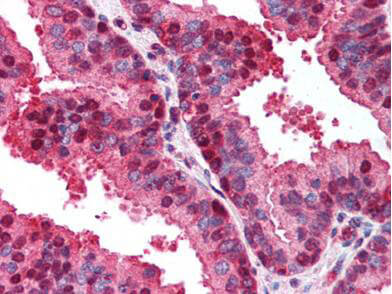Anti-p16 (RABBIT) Antibody
p16 Antibody
- SPECIFICATION
- CITATIONS
- PROTOCOLS
- BACKGROUND

| Host | Rabbit |
|---|---|
| Conjugate | Unconjugated |
| Target Species | Human |
| Reactivity | Human |
| Clonality | Polyclonal |
Application
| WB, IHC, E, IP, I, LCI |
| Application Note | This product was tested by immunoblot and found to be reactive against p16 from cell lysates and E.coli produced fusion proteins at a dilution of 1:1000 followed by reaction with Peroxidase conjugated Affinity Purified anti-Rabbit IgG [H&L] (Goat) (code #611-1302). Anti-p16 is suitable for the detection by immunoblot of human p16. This antisera is also suitable for immunoprecipitation of in vitro translated protein and cell lysates (Saos-2, 3T3-L1 weakly) and will co-precipitate associated proteins including p15 and potentially p15.5. This product was tested in IHC. |
| Physical State | Liquid (sterile filtered) |
| Immunogen | human p16 protein (missing the first 7 amino acids) |
| Preservative | 0.01% (w/v) Sodium Azide |
| Gene ID | 1029 |
|---|---|
| Other Names | 1029 |
| Purity | This product was prepared from monospecific antiserum by delipidation and defibrination. Antiserum will specifically react with a p16 protein from human tissue. Cross reactivity may occur with p15 when immunoprecipitating in vitro translated product but not in immunoblots. Potentially cross reacts with p15.5. |
| Storage Condition | Store vial at -20° C prior to opening. Aliquot contents and freeze at -20° C or below for extended storage. Avoid cycles of freezing and thawing. Centrifuge product if not completely clear after standing at room temperature. This product is stable for several weeks at 4° C as an undiluted liquid. Dilute only prior to immediate use. |
| Precautions Note | This product is for research use only and is not intended for therapeutic or diagnostic applications. |
| Name | CDKN2A (HGNC:1787) |
|---|---|
| Synonyms | CDKN2, MTS1 |
| Function | Acts as a negative regulator of the proliferation of normal cells by interacting strongly with CDK4 and CDK6. This inhibits their ability to interact with cyclins D and to phosphorylate the retinoblastoma protein. |
| Cellular Location | Cytoplasm. Nucleus |
| Tissue Location | Widely expressed but not detected in brain or skeletal muscle. Isoform 3 is pancreas-specific |

Thousands of laboratories across the world have published research that depended on the performance of antibodies from Abcepta to advance their research. Check out links to articles that cite our products in major peer-reviewed journals, organized by research category.
info@abcepta.com, and receive a free "I Love Antibodies" mug.
Provided below are standard protocols that you may find useful for product applications.
Background
The gene for CDK2NA generates several transcripts/proteins which differ from each other in their first exons. Three of these transcripts are generated by alternative splicing (isoform 1 a.k.a p16INK4A, isoform 2 and isoform 3 a.k.a p12), two of which are known to function as inhibitors of CDK4 kinase. One other transcript that is generated from this gene contains an alternate reading frame (ARF), with the first exon located 20kb upstream of the remainder of the gene (isoform 4 a.k.a. p14ARF, p19ARF, ARF). In spite of the structural and some functional differences, all the proteins encoded by the CDKN2A gene are involved in cell cycle G1 control.
If you have used an Abcepta product and would like to share how it has performed, please click on the "Submit Review" button and provide the requested information. Our staff will examine and post your review and contact you if needed.
If you have any additional inquiries please email technical services at tech@abcepta.com.













 Foundational characteristics of cancer include proliferation, angiogenesis, migration, evasion of apoptosis, and cellular immortality. Find key markers for these cellular processes and antibodies to detect them.
Foundational characteristics of cancer include proliferation, angiogenesis, migration, evasion of apoptosis, and cellular immortality. Find key markers for these cellular processes and antibodies to detect them. The SUMOplot™ Analysis Program predicts and scores sumoylation sites in your protein. SUMOylation is a post-translational modification involved in various cellular processes, such as nuclear-cytosolic transport, transcriptional regulation, apoptosis, protein stability, response to stress, and progression through the cell cycle.
The SUMOplot™ Analysis Program predicts and scores sumoylation sites in your protein. SUMOylation is a post-translational modification involved in various cellular processes, such as nuclear-cytosolic transport, transcriptional regulation, apoptosis, protein stability, response to stress, and progression through the cell cycle. The Autophagy Receptor Motif Plotter predicts and scores autophagy receptor binding sites in your protein. Identifying proteins connected to this pathway is critical to understanding the role of autophagy in physiological as well as pathological processes such as development, differentiation, neurodegenerative diseases, stress, infection, and cancer.
The Autophagy Receptor Motif Plotter predicts and scores autophagy receptor binding sites in your protein. Identifying proteins connected to this pathway is critical to understanding the role of autophagy in physiological as well as pathological processes such as development, differentiation, neurodegenerative diseases, stress, infection, and cancer.


